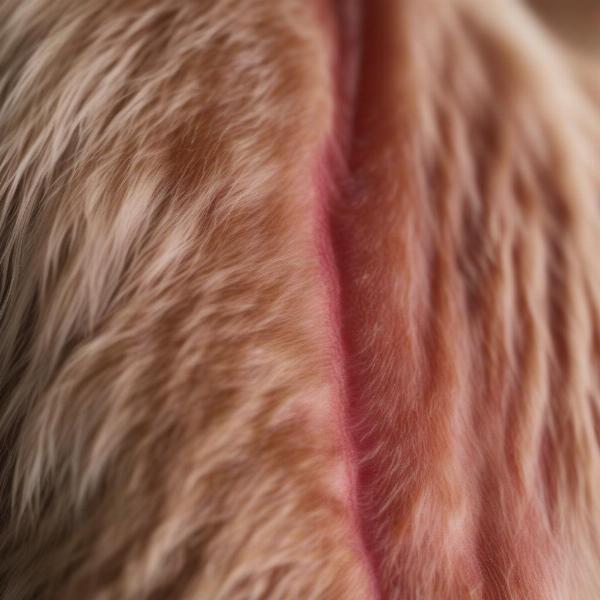Giving human medications to dogs can be risky, and antihistamines like Piriteze (cetirizine) are no exception. While cetirizine can be used in dogs in certain situations, it’s crucial to understand the potential risks and never administer it without consulting a veterinarian. This article explores the safety and considerations surrounding the use of Piriteze in dogs, helping you make informed decisions about your furry friend’s health.
Understanding Piriteze and Its Use in Dogs
Piriteze, also known as cetirizine, is a second-generation antihistamine commonly used to treat allergies in humans. It works by blocking histamine receptors, which are responsible for allergic reactions like itching, sneezing, and watery eyes. While vets may prescribe cetirizine for dogs experiencing similar allergy symptoms, the dosage and frequency differ significantly from human usage. It’s important to remember that a dog’s metabolism and sensitivity to medications can vary greatly from a human’s, making self-medicating extremely dangerous.
When Might a Vet Prescribe Cetirizine for a Dog?
Veterinarians might consider prescribing cetirizine for dogs experiencing various allergic reactions, such as:
- Environmental allergies: Pollen, dust mites, mold, etc.
- Insect bites: Fleas, mosquitoes, bees, etc.
- Food allergies: Certain proteins, grains, etc.
- Contact dermatitis: Reactions to certain materials like fabrics or plants.
Cetirizine is typically used to manage mild to moderate allergic symptoms. In some cases, it can also be used to treat hives or reduce itching associated with skin conditions. However, it’s essential to determine the underlying cause of the allergy to provide the most effective treatment.
Risks and Side Effects of Cetirizine in Dogs
While generally considered safe when prescribed by a vet, cetirizine can cause side effects in some dogs, including:
- Drowsiness or lethargy: This is a common side effect and usually mild.
- Dry mouth: Ensure fresh water is always available.
- Vomiting or diarrhea: These are less common but can occur.
- Increased appetite or decreased appetite: Monitor your dog’s eating habits.
- Changes in behavior: Observe for any unusual behavior changes.
If your dog experiences any of these side effects, contact your veterinarian immediately. In rare cases, more severe reactions can occur, such as difficulty breathing or swelling of the face.
What to Do If Your Dog Has an Allergic Reaction
If your dog displays signs of an allergic reaction, such as excessive itching, sneezing, hives, or difficulty breathing, do not give them Piriteze or any other human medication without consulting your veterinarian first. Instead, contact your vet immediately. They will be able to diagnose the cause of the allergy and recommend the appropriate treatment, which might include cetirizine or other medications.
 Dog with hives on skin
Dog with hives on skin
Safe Allergy Management for Your Dog
Managing your dog’s allergies often requires a multifaceted approach. Besides medication, consider these strategies:
- Identify and avoid allergens: If possible, minimize exposure to known allergens.
- Regular grooming: Frequent bathing and brushing can help remove allergens from your dog’s coat.
- Hypoallergenic diet: If food allergies are suspected, a hypoallergenic diet can be beneficial.
- Flea and tick prevention: Prevent bites from these common allergy triggers.
Conclusion
While Piriteze (cetirizine) can be used to treat allergies in dogs, it should only be administered under the guidance of a veterinarian. Never self-medicate your dog, as this can lead to serious health consequences. By working closely with your vet and implementing appropriate allergy management strategies, you can help your furry friend live a comfortable and itch-free life.
FAQ
- Can I give my dog human Piriteze? No, it’s not recommended to give your dog human Piriteze without consulting your vet.
- What should I do if my dog has an allergic reaction? Contact your veterinarian immediately for diagnosis and treatment recommendations.
- What are the common side effects of cetirizine in dogs? Drowsiness, dry mouth, vomiting, diarrhea, and changes in appetite are potential side effects.
- How can I manage my dog’s allergies besides medication? Avoid allergens, groom regularly, consider a hypoallergenic diet, and practice flea and tick prevention.
- Is cetirizine safe for all dogs? While generally safe when prescribed by a vet, some dogs may experience side effects. Consult your veterinarian.
- What are the signs of an allergic reaction in dogs? Excessive itching, sneezing, hives, and difficulty breathing can be signs of an allergic reaction.
- Can cetirizine cure my dog’s allergies? Cetirizine manages symptoms but doesn’t cure allergies. Addressing the underlying cause is essential.
ILM Dog is a leading online resource for dog owners worldwide, offering expert advice on dog breeds, health, training, nutrition, grooming, and much more. We are committed to providing practical and reliable information to help you provide the best possible care for your canine companion. For any questions or inquiries, please contact us at [email protected] or call us at +44 20-3965-8624. Visit ILM Dog for more valuable insights and resources to support your dog’s well-being.